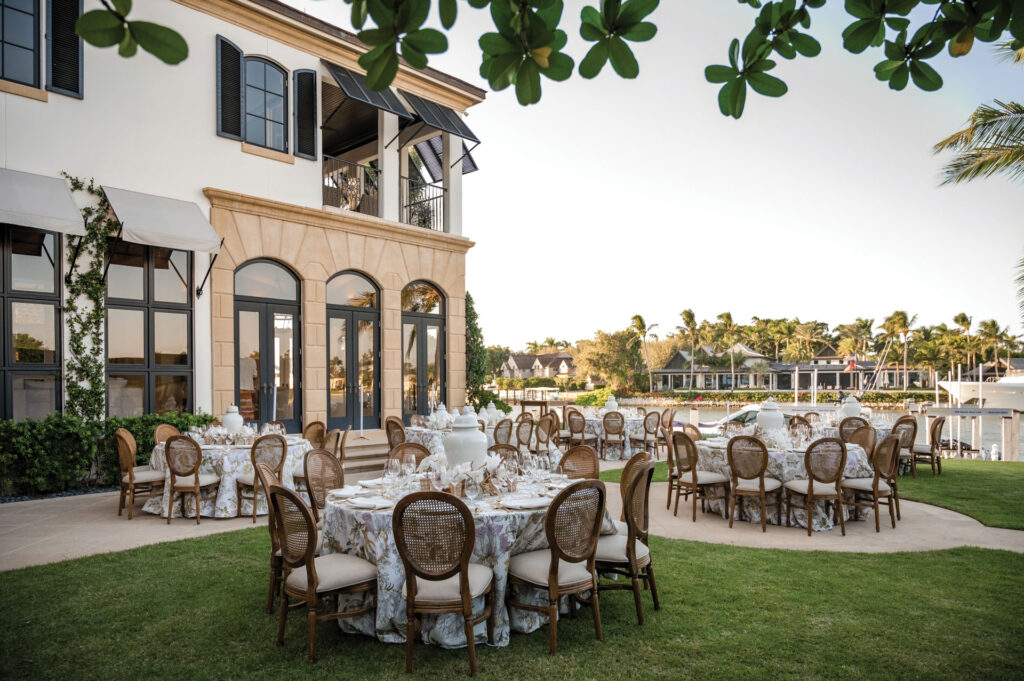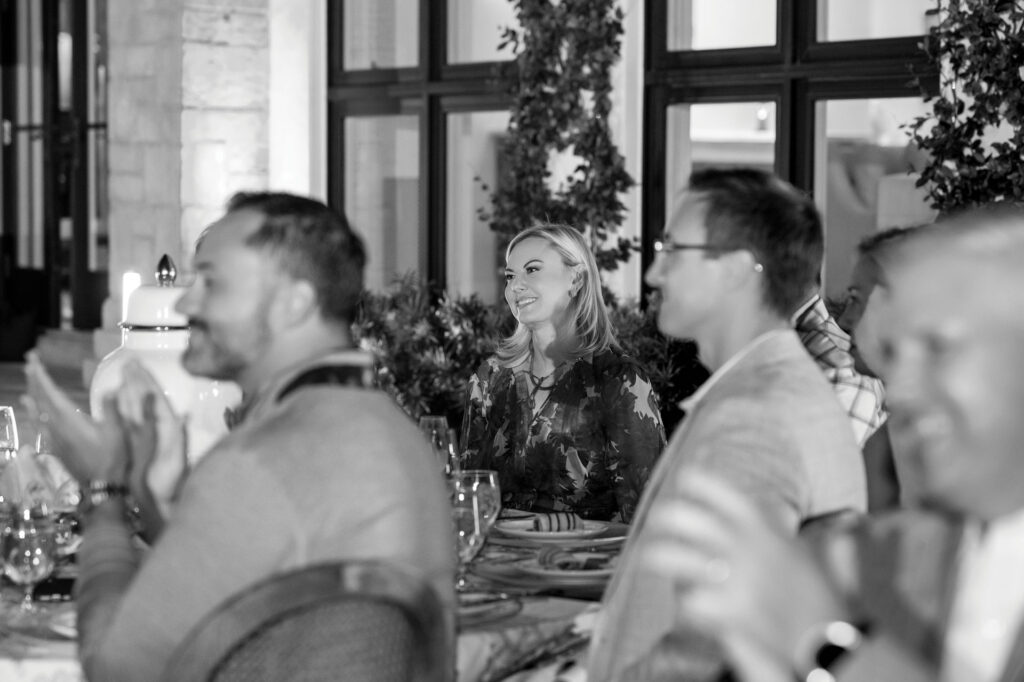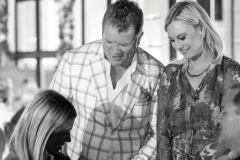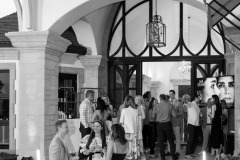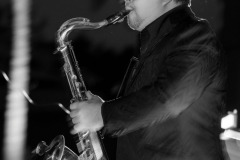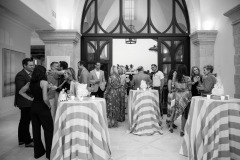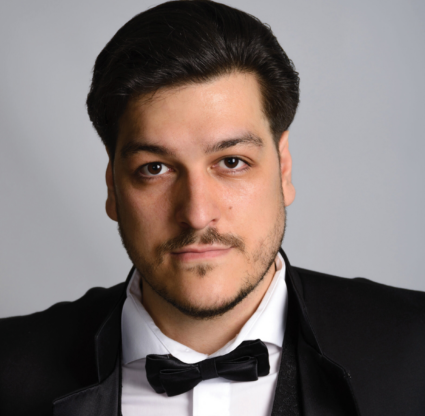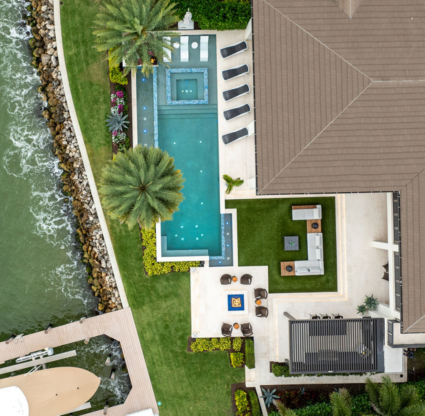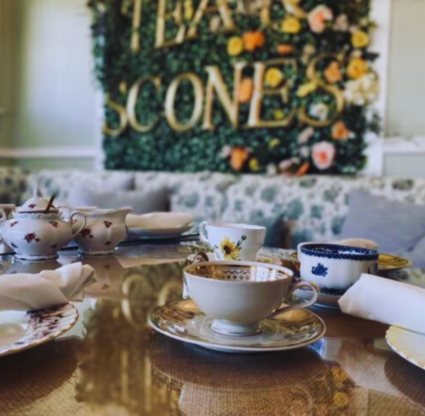Amy and John Quinn had one idea when going into the 2023-2024 Southwest Florida social season—they wanted everyone to be thinking about mental health.
The Naples couple, who runs the mental health- and education-focused Fountain 33 Foundation, is chairing the upcoming Sound Minds fundraiser for David Lawrence Centers (DLC) on March 21. To kick the season off, they hosted a Sound Minds cultivation dinner in early November, just as Naples’ gliteratti were returning to their winter haven. “I want people to be excited,” John noted as guests arrived. “This doesn’t have to be a somber event. This could be an encouraging and uplifting event, because we’re going to help people change their lives.”
Southwest Floridians know, we draw more honey with hope than dread. From around November to April, locals gather for boisterous benefit events, ranging from intimate dinners to 500-person galas. Decked in full splendor, the parties are anchored in philanthropy, raising awareness and funds for the hundreds of nonprofits that sustain a region where government funding for social services is sparse. It would be easy to get caught up in the festivities, but when you see the results (like the $33 million raised in four hours at the Naples Children & Education Foundation’s 2024 Naples Winter Wine Festival, which John and Amy also support), it’s easy to see, people are showing up for more than a good time.
On that breezy fall evening in the Quinn’s historic Port Royal estate, the guest list was stacked with institutional and newer Naples family names—Stayer, Hills, Hoffmann, Hartington, Van Arsdale, Ustayev. Top of mind for the Quinns was the hope of igniting next-generation patrons toward the cause. “We want to spur [a younger generation of leaders] to join us and make a difference in mental health every day,” John says. Within a couple months of the November dinner, Sound Minds VIP tickets were sold out, and the entire event was well on its way to being at capacity.
Halfway through the night—a soft, Everything Zen-themed soiree, with orchids adorning tables from 50Fifty Creative Services and delicacies, like snapper crudo and butter-poached lobster—Amy stood in front of the group to share her story. Throughout her childhood, Amy was a high-achieving, straight-A student and top athlete. She recalls the bouts of gloom she felt growing up, how deeply she felt things, and how she’d struggle to bounce back from adversity. “Maybe if I could have gotten some help at that point, I would have learned how to manage some of those strong feelings,” she says. In her freshman year of college, Amy spiraled into a darkness she couldn’t pull herself out of. She was sleeping too much or not at all, missing class, drinking—all the symptoms we now know come with depression and anxiety. Partway through the semester, she dropped out and returned home.
Amy was fortunate—care was easy to find in her California hometown, and her family had the means to provide. The mother of three went on to pursue a career in mental health and now practices as a licensed marriage and family therapist. She recently went back to school to get her Doctor of Education degree, with thoughts of returning to academia one day. Though Amy had previously shared part of her story on WINK News, this was the first time she was telling her story publicly, live on the spot, in a space filled with dozens of friends, neighbors and mere acquaintances. She was vulnerable, exposed—but also relieved, proud of the prospect of making it easier for others to share their story. “If we can share what’s going on, and we can feel not shameful about it, we can encourage [people] to open up about their own struggles and ultimately help each other,” she says.
John didn’t think much about mental health before he met Amy, 16 years ago. Growing up in a military household, he’d been taught to put up a brave face and sweep things under the rug. John was 11 years old when his sister passed away, leaving scars that he’s only begun to unpack in adulthood. “I wish I was in a family that talked about things, because you need to get things off your chest,” John says. “You need to go through the major emotions on whatever may have happened.”
For organizations like David Lawrence, whose areas of focus have been mired in stigma for decades, the sharing of personal stories is crucial. The more we see people who appear to have it all together show the turbulences within, the easier it is to recognize our own struggles. The easier it is to reach out for help. The more likely we are to want to help someone else. Following a line of blockbuster speakers at recent Sound Minds luncheons, this year, DLC brings model and actress Brooke Shields to the stage to talk about her struggles growing up as a sex symbol in Hollywood, when she was still a teenager; her fight with postpartum depression and suicidal ideation; and dealing with her mother’s addiction.
While A-list power is a big draw, in a community-driven town like Naples, the personal stories from neighbors and the conversations that emerge over coffee, during school pick-up or at events like the Quinns’ November cultivation dinner can go further. Along with raising awareness, supporting preventative programs and stepping up with services, the November dinner guests spoke of the urgency to openly discuss mental health. “We have to get to the point where [going to a counselor] is no different than going to your primary care doctor—where we don’t differentiate between the brain, the heart or any other organ in the body,” David Lawrence Centers CEO Scott Burgess says. “If you break your leg, you wouldn’t wait to go see a surgeon,” John adds.
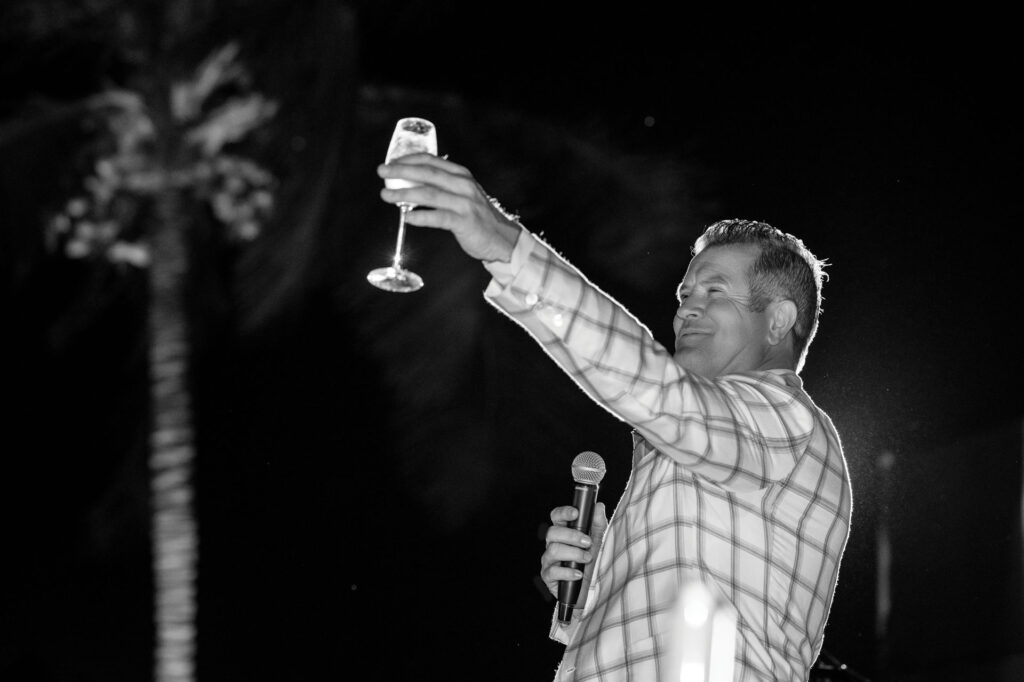
WINK reporter Elizabeth Biro floated around the party during cocktail hour, polling attendees: Entrepreneur David Hoffmann called mental health the biggest issue facing our country. “This is not something to be ashamed of, it’s something to be treated,” he says.
When people talk about the mounting mental health crisis, it’s no exaggeration. In Collier County, one in four adults and children need mental health treatment, and one in seven will be treated for addiction. As the population balloons to the projected 2024 figure of roughly 400,000, the need only escalates. “We have to be proactive,” Scott says. He is quick to point out how suicide is currently the second-leading cause of death for children locally and nationally. “What more rallying cry do we need?” he asks.
With limited funding for mental health from insurance providers and at the local and state government level, nonprofits shoulder the overload of need—and in Collier County, David Lawrence Centers is at the center of it all. Started in 1968 by a group of Neapolitans, including the locally dubbed First Lady of Mental Health, Polly Keller, DLC has some of the most multifaceted and robust programming of any mental health nonprofit. The group only gets half of its annual $35 million budget from the government; the other $17.5 million needs to be raised.
Among the 340,000 services the nonprofit provides annually, there’s the stuff you may be aware of: outpatient and inpatient treatments, specialized trauma therapies for children and vets, detox programs, support groups. Then, there are all the essential and forward-thinking programs DLC leads, including affordable housing for people diagnosed with mental illness, preventative programs for school children, and a close partnership with the sheriff’s department that aims to, when appropriate, route cases through DLC for treatment. “We are trying to better identify when people are having these struggles and put them into a situation that’s going to be more of a solution rather than just something that exacerbates the issue,” Scott says. “And they can co-occur—we can hold people accountable but also make sure that they’re getting treatment.” The partnership marks one of the many ways DLC is proactive in the fight toward mental health.
At the end of January, the nonprofit announced a historic $150 million campaign, Hope for Collier: Building Stronger Minds Together, kicked off by an $10 million gift from longtime Naples philanthropist Julia Van Domelen’s foundation. The multi-pronged initiative banks on the idea that the only way forward is through unity. “We don’t want to hunker down in our own tribes, but really try to care for each other again as a community,” Scott says. “We’ve lost some of that in our society, and it’s such a critically important element to living well for all.”
“Better is a neighbor who is near than a brother who is far away,” the proverb, thought to be about 3,000 years old, says. The community-driven campaign includes plans for a 25,000-square-foot children and family center to address the crisis around kids’ mental health. As parents to three young kids, Amy and John see children’s preventative programs as key. “If we can help kids identify these things and seek help and know where to turn, their trajectory is just going to be that much better,” Amy says. “They’ll be more successful as they embark on their young adult lives and into adulthood, which also serves the entire community.”
When DLC approached the Quinns about chairing the Sound Minds event last year, they didn’t hesitate. It was only their first year being involved with the nonprofit, but they were all in after one tour of the main campus with Scott. “People don’t realize all the other outpatient services and partnerships with other organizations they do to reach the greater community—that was really eye-opening for us,” John says.
Before moving to Southwest Florida, the Quinns thought of opening a counseling center, and while the idea is not off the table, once they got to Naples, the couple recognized there were many more avenues here to have a wide-reaching impact. “There are many resources and so much movement behind mental health right now,” John says. “It’s a really good time to continue to push the ball down the court.”
Photography by Anna Nguyen

